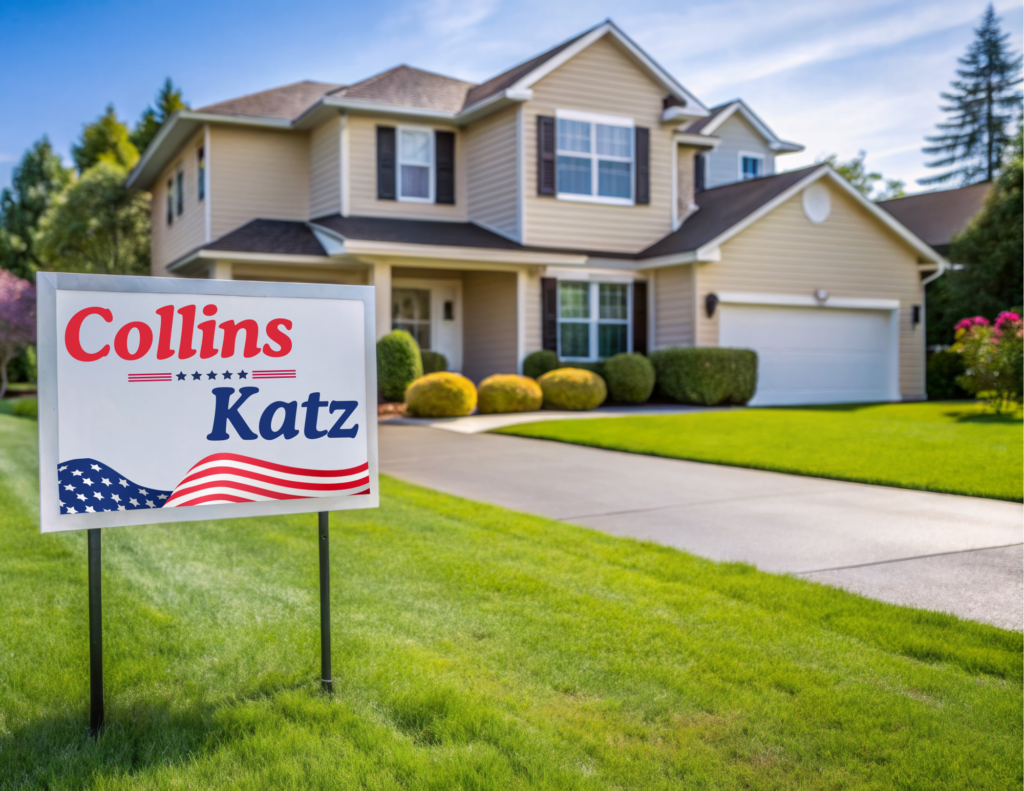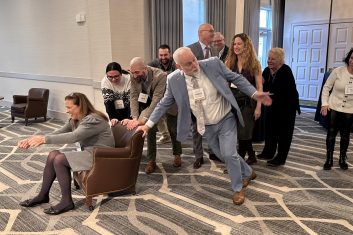
With the Republican and Democratic National Conventions behind us, campaign season is now in high gear. Many people feel very strongly about who should become our next president and would like to convince as many people as possible to vote for their preferred candidate. While not everyone has the time to volunteer for a campaign or the means to make donations, many people will participate in the campaign season by wearing
t-shirts and buttons, as well as affixing partisan bumper stickers to their vehicles. Others will display their political views from their homes by placing signs in their windows or on their lawns.
PENNSYLVANIA
For Pennsylvania residents who live in community associations, the ability to display political signs may be restricted or even prohibited by an association’s governing documents. Despite the importance of a presidential election, political signs displayed in community associations enjoy no special protections in Pennsylvania. Signage restrictions in a community association’s governing documents apply equally to “for sale” signs, yard sale signs, and political signs. So while you may wish to inform your neighbors about how much money a particular candidate received in exchange for his or her soul, you may not be able to convey this information via a yard or window sign.
Given the strong feelings that a presidential election evokes, challenges surrounding signage restrictions during an election year are common. The most common challenge to signage restrictions is based upon the First Amendment to the United States Constitution. Specifically, a resident will commonly argue that the association’s prohibition on signage infringes upon his or her freedom of speech. While such arguments wrapped in other patriotic language sound compelling at first, community association residents need to be reminded that both the United States Constitution and the Pennsylvania Constitution protect people against the government from interfering with speech. In Pennsylvania, community associations are not considered to be government actors.
In the case of Midlake on Big Boulder Lake, Condominium Association v. Cappuccio, the Pennsylvania Superior Court upheld the association’s ability to restrict its unit owners from displaying signs. The court held that the community association was a “private organization, and as such, cannot abridge the rights of the First Amendment of the Constitution.” The court further supported its decision by recognizing the impact of an individual’s voluntary decision to purchase a unit within a community association. Specifically, the court held the following:
The Courts of this Commonwealth have vigorously defended the rights which are guaranteed to our citizens by both the federal and our Commonwealth’s constitutions. One of the fundamental precepts which we recognize, however, is the individual’s freedom to contractually restrict, or even give up, those rights. [The unit owners] … contractually agreed to abide by the provisions in the Declaration at the time of purchase, thereby relinquishing their freedom of speech concerns regarding placing signs on this property.
So as long as an association is evenly and uniformly enforcing its governing documents, a restriction on the displaying of signs will likely be upheld in Pennsylvania.
NEW JERSEY
However, those same principles are not the law of the land across the Delaware River in New Jersey. In Mazdabrook Commons Homeowner’s Association, Inc. v. Khan, decided in June 2012, the New Jersey Supreme Court considered the question of whether a community association may prohibit residents from posting political signs in the windows of their own homes. The court determined that such a restriction was unconstitutional, even when contained in the association’s governing documents, holding that “[b]alancing the minimal interference with [the association’s] private property interest against [the unit owner’s] free speech right to post political signs on his own property, we conclude that the sign policy in question violates the free speech clause of the [New Jersey] State Constitution.”
In deciding Mazdabrook, the Supreme Court held that a “near complete ban on residential signs, which bars all political signs, cannot be considered a minor restriction as to Khan” because “it hampers the most basic right to speak about the political process and his own candidacy for office.” As a result, community associations in New Jersey cannot absolutely ban a unit owner’s right to post a political sign on his or her own property even if that property is subject to community rules and regulations. However, the court reaffirmed an association’s right to enact reasonable time, place, and manner restrictions on signs, such as limiting the number of signs or location of those signs.
In addition, the Supreme Court in December 2014 adopted a new test for determining whether the New Jersey State Constitution protects free speech on private property. In Dublirer v. 2000 Linwood Avenue Owners, Inc., the court adopted a new standard, requiring courts to “focus on ‘the purpose of the expressional activity undertaken’ in relation to the property’s use” and to consider the “general balancing of expressional rights and private property interests” to determine “‘the fairness of the restrictions imposed’ with regard to residents’ free speech rights.”
In Dublirer, Mr. Dublirer requested to distribute information promoting his campaign for election to the co-op board under residents’ doors, but the co-op’s rules prohibited distribution without board consent, which was denied. Ultimately, the Supreme Court determined that Mr. Dublirer’s attempt to communicate with other residents regarding his election campaign was protected speech, compatible with the residential nature of the property. Further, the court found that Mr. Dublirer’s actions would have a minimal impact on the residents and that there were insufficient alternatives available to Mr. Dublirer to speak directly to other residents. Most importantly, the court determined the co-op’s rules were so restrictive as to be unreasonable. However, as was the case in Mazdabrook, the court did reaffirm that community associations may impose reasonable time, place, and manner restrictions on residents’ speech.
Put simply, when it comes to a resident of a New Jersey community association who seeks to express him or herself within the community, by political sign or otherwise, the courts now are directed to look at the relationship of the speech to the residential nature of the property, the reasonableness of the restriction imposed, whether there are adequate alternate means for the resident to express him or herself, and the impact the speech will have on other residents’ rights.
These decisions make New Jersey unique, because unlike Pennsylvania where community associations are not considered to be government actors, New Jersey imposes State Constitutional free speech protections on private property that is not open to public access, albeit limiting such protection to resident speakers.
ABOUT THE AUTHORS

Matthew C. Collins, Esq. serves as the Chair of the Community Association Practice Group at Horn Williamson. He represents community associations throughout Pennsylvania, providing his clients with expert advice so they can navigate difficult situations and resolve issues in a practical and cost-effective manner.
Community associations routinely engage Matthew for assistance with governing document interpretation and enforcement; contract negotiation and drafting; guidance through the transition process; construction defect litigation; collections; and director liability claims. He is also sought after by individuals and businesses for his strategic guidance and innovative solutions on matters involving contracts, real estate, and commercial disputes. Mr. Collins can be contacted via email at: mcollins@hornwilliamson.com. Visit Horn Williamson online at: www.hornwilliamson.com.

Jonathan H. Katz, Esq. is a shareholder and part of Becker Poliakoff’s New Jersey Community Association practice group. Mr. Katz concentrates his practice in the areas of community association law and general litigation, representing condominium and homeowners associations throughout New Jersey.
Mr. Katz is admitted to practice in New Jersey and Pennsylvania. Prior to joining Becker, Mr. Katz served as the law clerk to the Honorable Philip S. Carchman, Superior Court of New Jersey, Appellate Division, and the Honorable Neil H. Shuster, Superior Court of New Jersey, Civil/General Equity, Mercer County. He earned his Juris Doctor from Rutgers School of Law – Camden and his Bachelor of Arts from Rutgers College. Contact Mr. Katz via email at: jkatz@beckerlawyers.com. Visit Becker online at: www.beckerlawyers.com.







